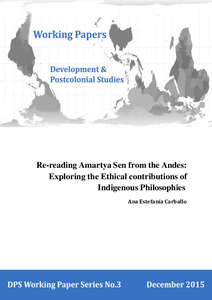Re-reading Amartya Sen from the Andes: Exploring the Ethical contributions of Indigenous Philosophies
| dc.date.accessioned | 2023-11-24T12:39:08Z | |
| dc.date.available | 2023-11-24T12:39:08Z | |
| dc.date.issued | 2015 | |
| dc.identifier | doi:10.17170/kobra-202311239067 | |
| dc.identifier.uri | http://hdl.handle.net/123456789/15217 | |
| dc.language.iso | eng | |
| dc.rights | Namensnennung - Weitergabe unter gleichen Bedingungen 4.0 International | * |
| dc.rights.uri | http://creativecommons.org/licenses/by-sa/4.0/ | * |
| dc.subject.ddc | 300 | |
| dc.subject.ddc | 320 | |
| dc.title | Re-reading Amartya Sen from the Andes: Exploring the Ethical contributions of Indigenous Philosophies | eng |
| dc.type | Working paper | |
| dcterms.abstract | Over the last decade, the calls for Buen Vivir (BV)/ Sumak Kawsay (SK) that have emerged from the Andes have prompted a revival of interest in the indigenous philosophies of the region and their contributions to alternative development thinking. Both in academic and policy discussions, there is an emphasis on recovering Indigenous forms of knowledge to devise alternative paths to development. Yet, given the conceptual ambiguity of discussions of development, these efforts often appear to have ‘blended’ with more mainstream notions of development thinking, which are deeply ingrained in the region. This has been the case with the Human Development (HD) paradigm, built upon Amartya Sen’s theoretical work. The HD offers a people-centred understanding of development that has been widely embraced by international institutions and national governments and which does not simply equate to the concerns within the SK/BV framework. Yet, in policy documents and development initiatives the ideas of SK/BV and HD have been linked and their differences blurred. This conflation has resulted in the emergence of an ‘environmentally conscious’ idea of development that pervades most current policy initiatives, what Catherine Walsh calls the ‘HD paradogma’ (Walsh, 2010). This paper argues that rather than rushing into tracing their parallels and similarities, SK/BV gives us the opportunity to push further the boundaries of HD. While the ethical questions that will be raised in this paper cannot be exhausted in the present scope of discussion, its analysis will identify both contradictions and potential avenues that could and should be further considered if we are to achieve a fruitful engagement between the ideas of HD espoused by Amartya Sen and those emerging from the Indigenous philosophies of the Andes. | eng |
| dcterms.accessRights | open access | |
| dcterms.creator | Carballo, Ana Estefanía | |
| dcterms.extent | 34 Seiten | |
| dc.contributor.corporatename | Kassel, Universität Kassel, Fachbereich Gesellschaftswissenschaften | |
| dc.subject.swd | Anden | ger |
| dc.subject.swd | Indigenes Volk | ger |
| dc.subject.swd | Sen, Amartya | ger |
| dc.subject.swd | Walsh, Catherine E. | ger |
| dc.subject.swd | Lokales Wissen | ger |
| dc.subject.swd | Buen Vivir | ger |
| dc.type.version | publishedVersion | |
| dcterms.source.series | DPS Working Paper Series | eng |
| dcterms.source.volume | No. 3/2015 | |
| kup.iskup | false | |
| ubks.epflicht | true |
Dateien zu dieser Ressource
Das Dokument erscheint in:
-
DPS Working Paper [17]


